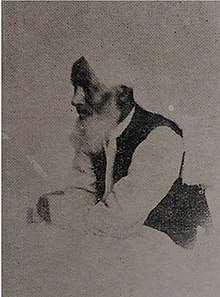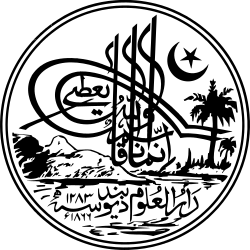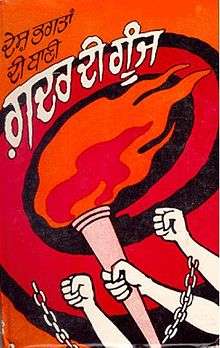Mahmud Hasan Deobandi
Mahmud Hasan Deobandi also known as Mahmud al-Hasan (1851 – 30 November 1920) was a Sunni Muslim scholar who was active against British rule in India. For his efforts and scholarship, he was given the title "Shaykh al-Hind" ("Shaykh of India") by the Central Khilafat Committee.[1] He was the first student of Darul Uloom Deoband. [2]He laid the foundation of Jamia Millia Islamia on 29 October 1920 at Aligarh.
Shaykh al-Hind, Maulana Mahmud al-Hasan | |
|---|---|
 | |
| Personal | |
| Born | 1851 |
| Died | 30 November 1920 (aged 68–69) |
| Resting place | Graveyard of Darul Uloom Deoband |
| Religion | Islam |
| Ethnicity | Indian |
| Denomination | Sunni |
| Jurisprudence | Hanafi |
| Movement | Deobandi |
| Main interest(s) | Tafseer, Indian Freedom Movement, Politics |
| Notable idea(s) | Fatwa on non-cooperation with British, Silk Letter Movement |
| Notable work(s) | Tarjuma Shaykh al-Hind, Adilla-e-Kamilah, Idaahul Adillah |
| Alma mater | Darul Uloom Deoband |
| Teachers | Mahmud Deobandi, Muhammad Qasim Nanautawi |
| Tariqa | Chishtiya-Sabiriya-Imdadiya |
| Muslim leader | |
| Disciple of | Rashid Ahmad Gangohi Haji Imdadullah |
Influenced by
| |
Influenced
| |
| Part of a series on |
| Deobandism |
|---|
 |
| Ideology and influences |
| Founders and key figures |
|
| Notable institutions |
| Centres (markaz) of Tablighi Jamaat |
| Associated organizations |
Early life
Mahmud Hasan was born in 1851 in the town of Bareilly (in modern Uttar Pradesh, India) to a family with a scholarly background.[1][3][4] His father, Muhammad Zulfiqar Ali, was a scholar of the Arabic language and worked in the education department of the British East India Company's administration in the region.[5]
As a child, Mahmud Hasan was with his father in Meerut during the Mutiny of 1857.[4]
Hasan received a traditional Islamic education with a strong emphasis on the study of Islam, the Persian language and Urdu. His primary education was under his uncle Mahtab Ali.[6][4] While Mahmud al-Hasan was studying the books Mukhtasar al-Quduri and Sharh-i-Tahdhib, the college known as Darul Uloom Deoband was established in 1866. [3]His father sent him to the newly established school, where he was the first student. There he studied with Mahmud Deobandi[6] and completed his basic studies in 1286 AH (1869/1870), after which he studied under the guidance of Muhammad Qasim Nanotvi, with whom he studied hadith. After that, he studied higher level books under his father. He graduated from Darul Uloom Deoband in 1873.[3][5]
In 1874, Mahmud Hasan joined Darul Uloom Deoband as a teacher and later got promoted to the position of the college principal in 1890.[3][5][1]
Revolutionary activities
Although focused on his work at the school, Maulana Mahmud al-Hasan developed an interest in the political environment of British India and the world. When the Ottoman Empire entered World War I against the British Empire in 1914, Muslims across the world were concerned of the future of the Sultan of Ottoman Empire, who was the caliph of Islam and spiritual leader of the global Muslim community. Known as the Khilafat struggle, its leaders Mohammad Ali Jouhar and Maulana Shaukat Ali organised protests across the country (see: partitioning of the Ottoman Empire). Mahmud al-Hasan was fervently active in encouraging Muslim students to join the movement. Hasan organised efforts to start an armed revolution against British rule from both within and outside India. He launched a programme to train volunteers from among his disciples in India and abroad who joined this movement in a large number. The most eminent among them were Maulana Ubaidullah Sindhi and Maulana Muhammad Mian Mansoor Ansari. Sending Sindhi to Kabul and Ansari to the North-West Frontier Province to mobilize popular support and recruit volunteers, Mahmud al-Hasan himself traveled to Hijaz to secure Turkish support in 1915.[3][5][1]
Obtaining the Turkish governor Ghalib Pasha's signature on a declaration of war against the British, Mahmud al-Hasan planned to return to India via Baghdad and Balochistan to start the rebellion. The plan, referred to as the Silk Letter Conspiracy, however, was leaked and captured by the Punjab CID, and he was arrested in Mecca. He was imprisoned in Malta, for more than three years before his release in 1920.[5][1][1]
After returning to British India, Mahmud al-Hasan joined the Khilafat movement. He also issued his famous fatwa (legal opinion on Islamic law) of non-cooperation against the British rule in India.[5][1]
Death and legacy
Mahmud Hasan died on 30 November 1920.[1] His endeavours won him the admiration not only of Muslims but also of Indians across the religious and political spectrum. He became an icon of the Indian independence movement, and was given the title of "Shaykh al-Hind" by the Central Khilafat Committee.[4] Hasan issued a fatwa making it the duty of all Indian Muslims to support and participate with Mahatma Gandhi and the Indian National Congress, who had prescribed a policy of non-cooperation — mass civil disobedience through non-violence.[4]
He laid the foundation stone of the Jamia Millia Islamia in October 1920, a university founded by Indian nationalists Hakim Ajmal Khan, Mukhtar Ahmed Ansari to develop an institution independent of British control.[5][1] He also wrote a well known translation of the Quran, the commentary of which was written by one of his students, Shabbir Ahmad Usmani. Mahmud al-Hasan supported modern education and also supported Darul Uloom Nadwatul Ulama established in 1893 in Lucknow.[1]
Shaikh-Ul-Hind Maulana Mahmood Hasan Medical College in Saharanpur is named after him. Asir Adrawi has written his biography enitled Shaykh al-Hind Hayat Aur Karname which is published by Shaikhul Hind Academy, Deoband. Darul Uloom Deoband has set up a research institute Shaikhul Hind Academy, named after him.
Literary works
He co-wrote an Urdu exegesis (Tafsir) of the Qur'an, called Tafsir-e-Usmani, with Shabbir Ahmad Usmani.[1]
Notable students
Mahmud Hasan is regarded as one of the main figures of Deobandi movement, every Deobandi scholar anywhere in the world traces back his educational lineage to Mahmud Hasan Deobandi. Shabbir Ahmad Usmani in the science of tafsir, Anwar Shah Kashmiri in hadith, Ubaidullah Sindhi, Husain Ahmad Madani and Muhammad Mian Mansoor Ansari in the politics, Kifayatullah Dihlawi, Mufti Shafi Usmani in fiqh, Ashraf Ali Thanwi in Tasawwuf are notable students of Mahmud Hasan.[7]
References
- Shaikhul-Hind Mahmood Hasan: symbol of freedom struggle on The Milli Gazette (newspaper) Published 12 February 2016, Retrieved 23 November 2019
- Asir Adrawi, Hayat Shaykhul Hind, Deoband: Shaykhul Hind Academy
- Rizwi, Syed Mehboob. "Shaikh al-Hind Maulana Mahmud Hasan". Tarikh Darul Uloom Deoband [History of the Dar al-Ulum Deoband]. 2. Translated by Murtaz Husain F Quraishi (1981 ed.). Deoband: Darul Uloom Deoband. p. 19–21.
- Tabassum, Farhat (2006). Deoband Ulema's Movement for the Freedom of India (1st ed.). New Delhi: Jamiat Ulama-i-Hind in association with Manak Publications. p. 98. ISBN 81-7827-147-8.
- "Maulana Mahmud al-Hasan (1851-1920)". Jamia Millia Islamia website. 11 November 2004. Archived from the original on 14 July 2006. Retrieved 23 November 2019.
- Asir Adrawi. Hazrat Shaykhul Hind: Hayat awr Karname [Shaykhul Hind: Life and Works] (in Urdu) (April 2012 ed.). Darul Uloom Deoband: Shaykhul Hind Academy. p. 38–39.
- Azizur Rahman Usmani. Tadhkirah Mashayikh-e-Deoband. Bijnor: Madeena Press. p. 206.
